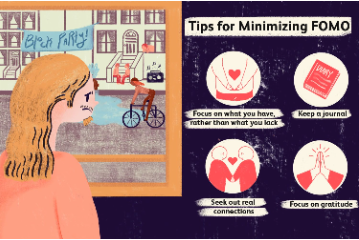FOMO: What are you missing out on?
Have you ever seen one of your friends post a picture of them hanging out with some other friends but you’re at home scrolling through Instagram? Did you feel left out and crushed? After all, “The human need to belong is an innate drive that dictates much of our behavior”, says the International Journal of Human-Computer Interactions Vol. 36. You might be experiencing FOMO. FOMO is an acronym that stands for fear of missing out and is experienced by all ages, genders, and races. Although not a mental condition, FOMO may cause feelings of envy and lower self-esteem; in some extreme cases it can even lead to anxiety or depression. In this day and age, social media often triggers FOMO. People only post their highlights and the best times on social media.
Social media has a positive correlation with FOMO. People constantly post photos of the best moments of their life and intentionally leave out times when things aren’t going so well. This gives people a false sense that their lives, compared to these “picture perfect” influencers, aren’t going as well as others. This contributes to their feelings of missing out on a better life that others are living. FOMO can also be attributed to certain events that might be going on in the world. For example, if there is a concert going on that all of your friends are going to that you can’t attend and you see your friends posting pictures of it while you are sitting in your room, you most likely will feel left out and the feeling of FOMO sets in. Many times this feeling evokes jealousy or envy.
FOMO is increasing as technology becomes more advanced and social media becomes more popular, especially among teens. Studies have shown that about 90% of teens aged 13-17 use social media. Many teens report feeling anxiety or jealousy after seeing posts involving events other people who are experiencing what they wished they could’ve experienced.
However, you can decrease the effects of FOMO. The first step is understanding that you can’t be a part of everything everywhere and you will always miss out on one thing or another. You won’t always be able to go out with friends, as scheduling conflicts will almost always arise. You might also literally not be able to attend specific events such as concerts or a fun amusement park that might be too far away to reasonably travel to. All of these measures are more or less unpreventable, and understanding that you will miss out is crucial to decreasing the effects of FOMO. Another way to reduce FOMO is by decreasing your consumption of social media. Since social media causes most of the FOMO felt by teens, decreasing your time on social media gives time to not think about the other things going on around you that are out of your control.
All in all, FOMO is everywhere, but changing your perspective on missing out and how you deal with these challenges can decrease the effects of FOMO and help you live a better life.



